In terms of WordPress competitors, they don’t come a lot bigger than Wix. Wix has made a name for itself by offering free websites that require absolutely no experience to create. The Wix team has grown its market share a great deal in recent years. WordPress, however, remains the 800-lb gorilla in the room. Because of its open-source approach, it powers well over 1/3 of the internet. Recent releases for WordPress have made the platform much more new-user friendly, so we are going to take you head-to-head with WordPress vs Wix to see which is the real no-fuss website-building platform.
1. WordPress vs Wix: Who Are They For?
Wix markets itself as “the platform that gives you the freedom to create, design, manage and develop your web presence exactly the way you want.” It is a fully hosted website platform. You use their page builder to make a professional-looking website from pre-designed templates. That means, first of all, that experienced website developers won’t get a lot out of Wix because they don’t get access to the inner workings. But people without that experience flock to Wix. They are drawn to its simplicity and ability to quickly get a good-looking website off the ground.
WordPress, on the other hand, is openly marketed toward “everyone.” Which is a pretty wide demographic. But because it’s the industry leader in market share, the strategy works for them. WordPress started as a blogging platform that has evolved into a full content management system (CMS). Because of that, users of any skill level can start with WordPress. They choose a theme and can start with their website in a flash. New users will find the Gutenberg block editor intuitive for page and post design. Experienced developers can dig into creating their features and designs by creating and coding their custom themes and plugins.
Both website platforms are incredibly easy for new users to jump into. And each has its unique quirks and learning curves.
2. Ease-of-Use
Users don’t want a lot of roadblocks in their way to creating a website and getting their content in front of people. You may be setting up your first site ever. Or your thousandth. Either way, break down how easy it is to get started with a website on WordPress vs Wix.
WordPress
WordPress originated as a blogging platform, which is evident in its core features, Posts and Pages. The platform’s simplicity and comprehensibility make it easy to use. Custom Post Types are used by major plugins and features, such as Toolset and WooCommerce, to expand the platform’s capabilities. Understanding the basic publishing workflow is enough for users to learn the platform’s advanced features.
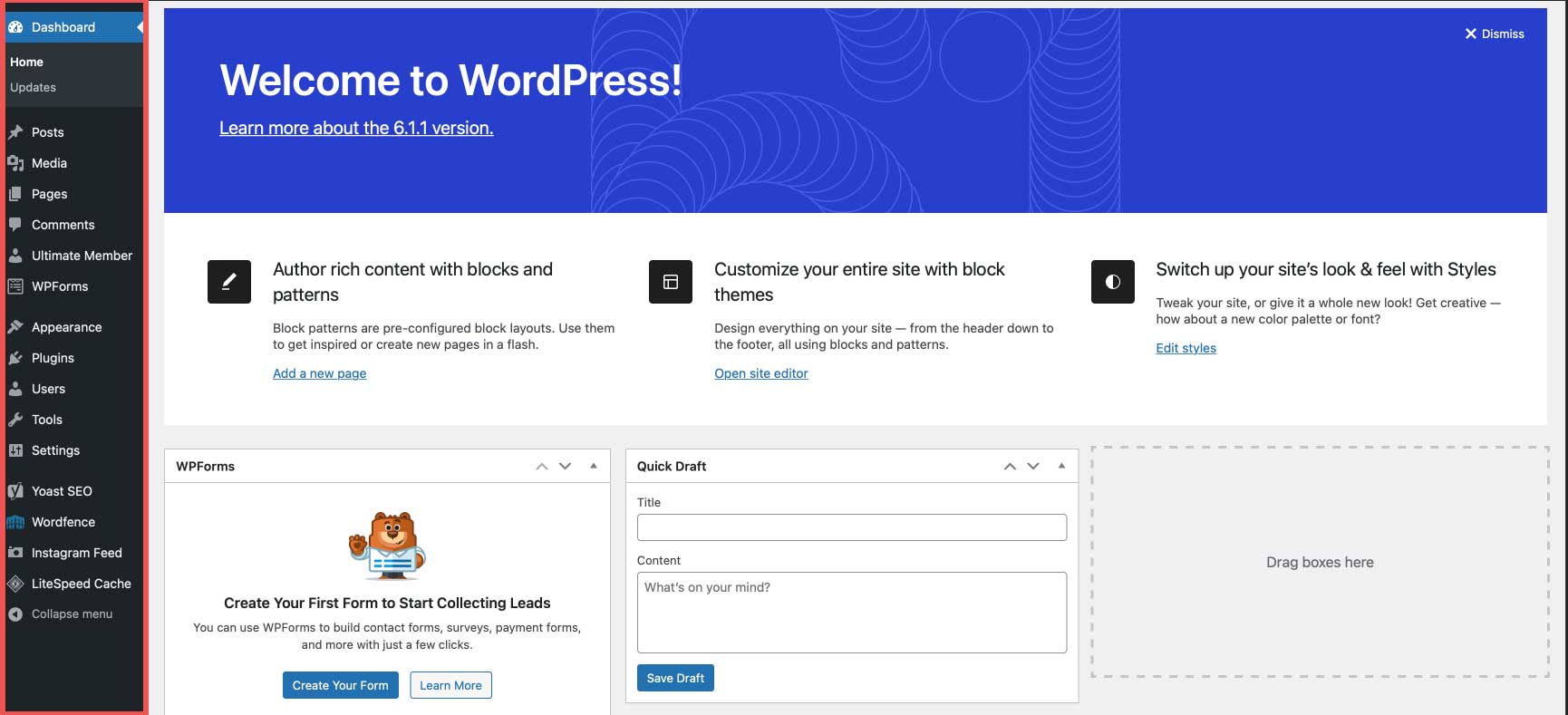
Regrettably, the dashboard and UI haven’t developed as seamlessly as other parts of the platform (e.g., the Gutenberg block editor). The left-hand sidebar can be perplexing and unintuitive for new users. Adding new plugins and themes can lead to clutter and poor navigation, which is expected.
By the time your dashboard gets as cluttered as the one above (which is from a site started in 2013), you will have learned to navigate it and use the features. However, that doesn’t change that the user experience is less-than-stellar.
The main challenge in learning WordPress is discovering the ideal themes and plugins. Thankfully, we can help you with that. We have an exhaustive library of posts to help you choose the best form plugins, some great options for social media integration, popular SEO plugins, as well as WooCommerce and blogging themes to help get you started.
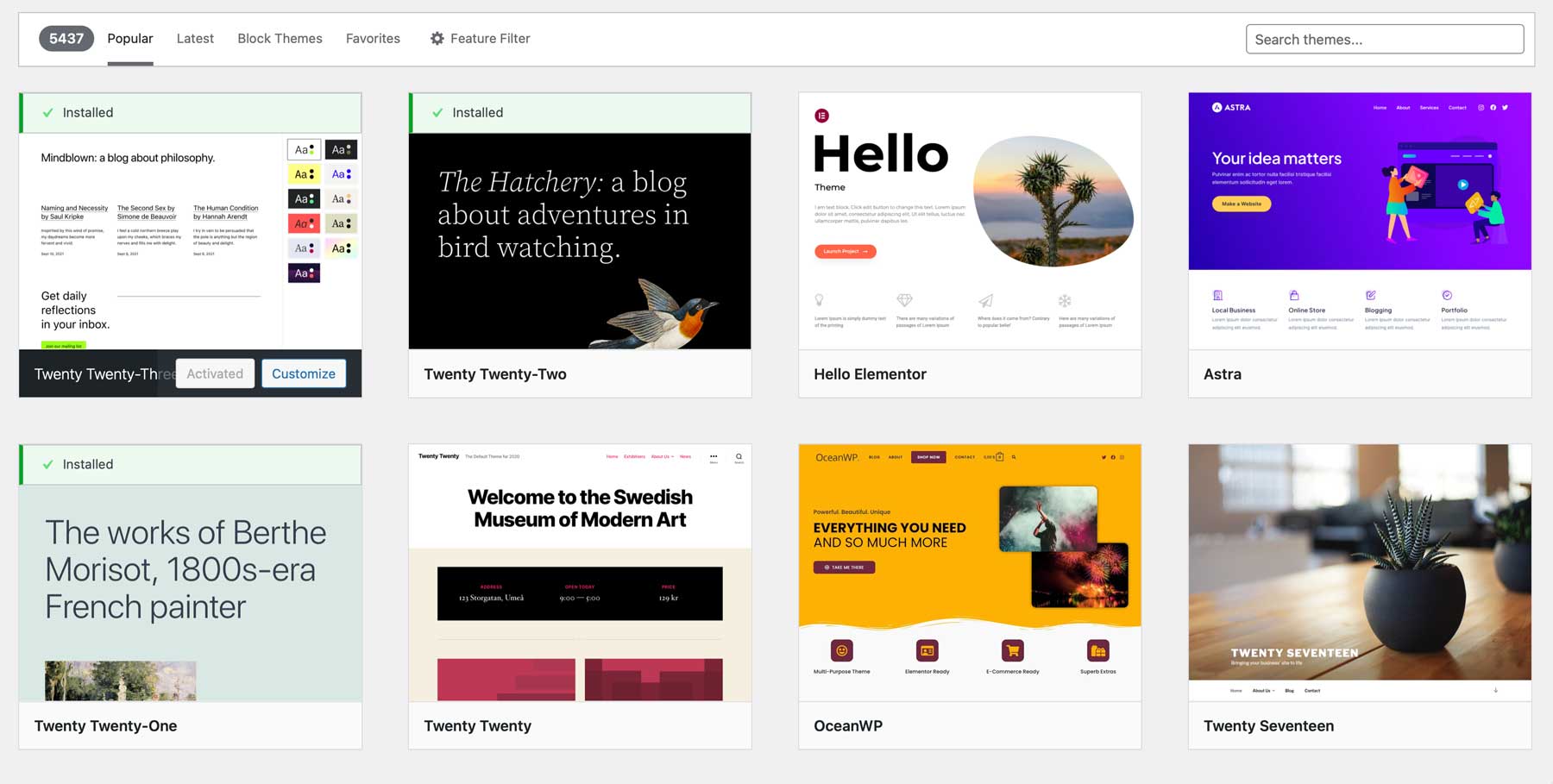
And if you don’t want to sink that time into it and need a website fast, the default themes and core features look nice and work immediately after installation.
Wix
Starting with Wix is a bit simpler than WordPress. There are a couple of calls to action on the page prompting you to get started with your free account.
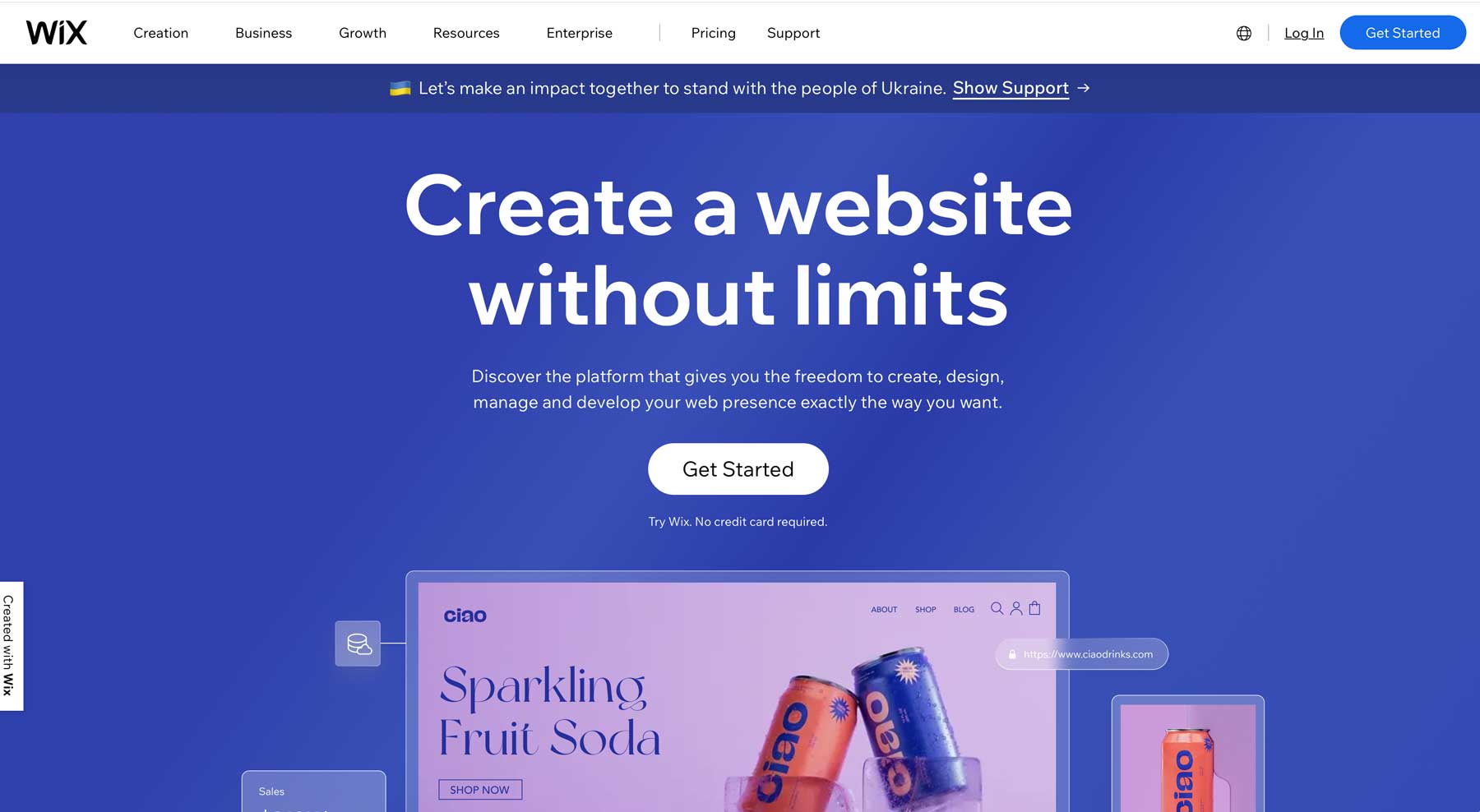
From there, you decide how you want to create the site. You can edit from the ground up using the drag-and-drop page builder. Or you and answer a series of questions about what kind of site you want to have. You might choose eCommerce or blog or portfolio. Whatever you choose, you’re then given a choice of features to include such as forums, contact forms, and email opt-ins. And finally, you choose between 6 different color/font themes and add what pages you want on the site (such as a blog or about me or policies, etc.).
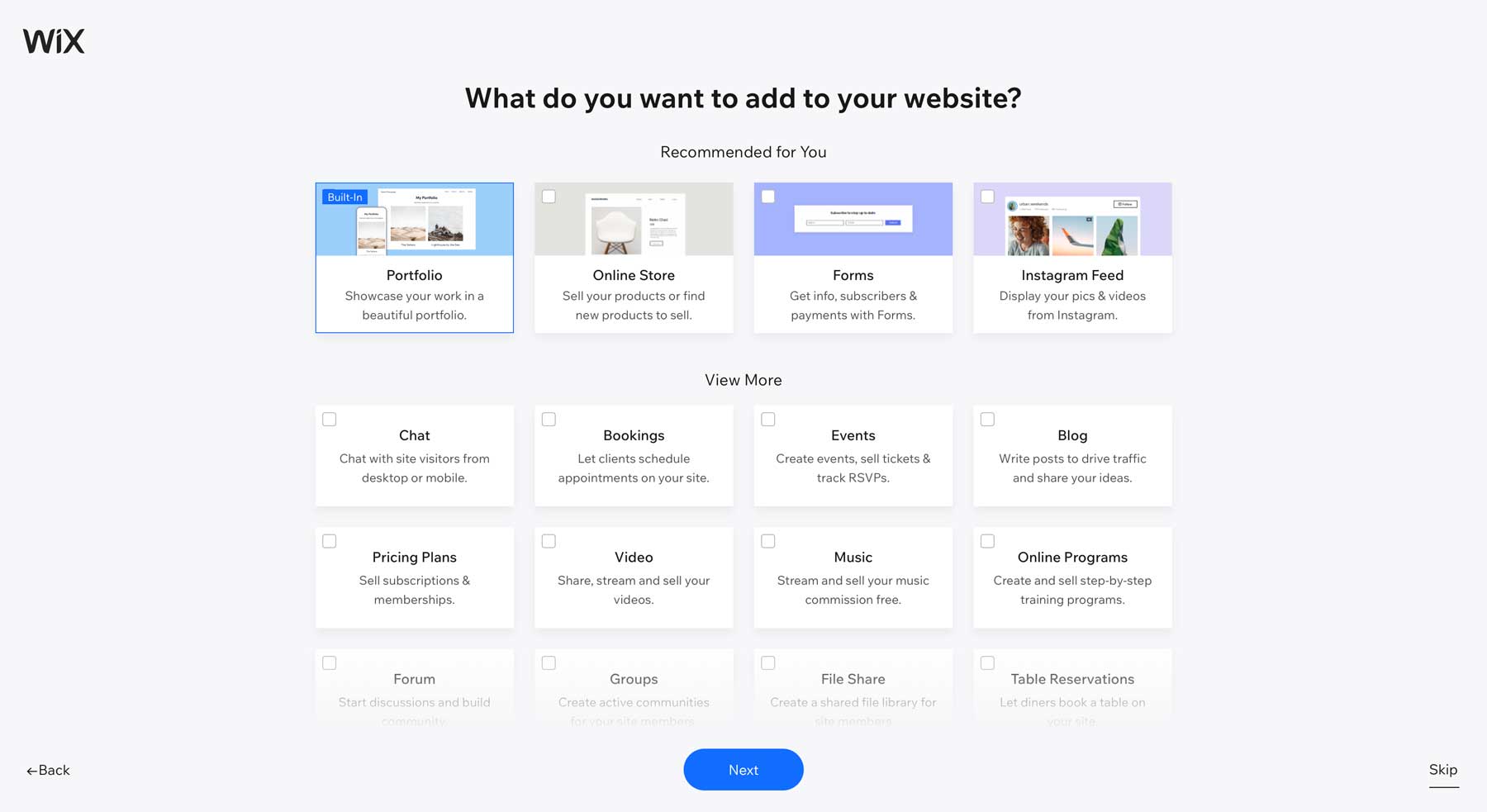
Once you choose these elements, Wix loads your dashboard. The whole process is straightforward. When it’s done, you have a ready-to-publish site (outside of not having your content, of course).
However, that’s when the simplicity and ease of use stop. From there, Wix takes you to your dashboard, which is just as cluttered (if not more so) as WordPress’s. But this one contains so many upsells that navigating to actual features you can use versus features locked behind a paywall is like running an obstacle course.
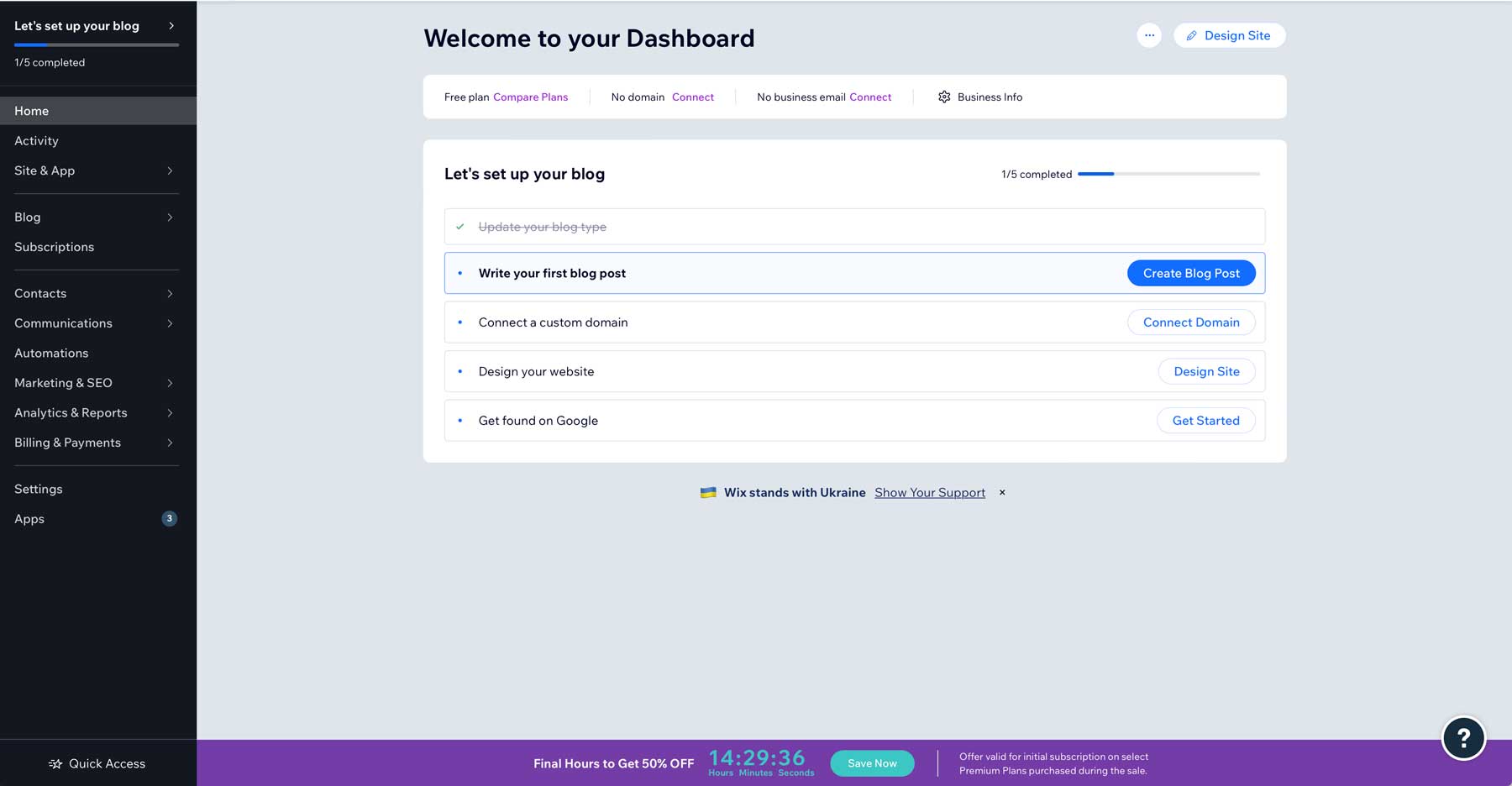
Nearly every click in their dashboard brings up some kind of upsell. Even pushing your site live brings up a screen-filling modal that makes it seem as though subscribing is how to proceed. Additionally, messages such as “Get Your Site on Google” and “Get Found on Google” are misleading to users, New website owners may not understand how search crawlers work and the site will be indexed regardless. All that feature does is connect the site to Google Search Console. Which is admittedly important for long-term success, whether your site is Wix vs WordPress.
We mention all of this in this section because this is most certainly an ease-of-use issue. The constant upsells are somewhat distracting. They get in the way of easily designing and launching a site, which is the primary focus of Wix’s marketing.
 |  |
|
|---|---|---|
| Ease of Use | 🏳 Draw Dashboard can be a bit difficult when a lot of plugins are installed, but the core elements are easy to understand. | 🏳 Draw Getting started is simple, with step-by-step instructions. That being said, the Wix dashboard is full of upsells and is very convoluted. |
| Choose WordPress | Choose Wix |
3. WordPress vs Wix: Page Builders
Over the past decade, page builders have brought non-designers the ability to create professional-looking websites through templates, drag-and-drop interfaces, and modular elements. Both Wix and WordPress offer these features, and in many ways is the primary way the platforms appeal to new website owners. We take a look at the builders available on both platforms so you know what you’re getting into with either.
WordPress Page Builders
In terms of ease-of-use, however, WordPress’s Gutenberg block editor does shine as an intuitive way to write and edit posts, as well as design pages (though page builder plugins such as Elementor, and Beaver Builder, and themes such as Divi offer much more advanced options when you get to need those). You add blocks, use built-in controls and options to place them, and then publish. You don’t even need to adjust CSS to create content with it.
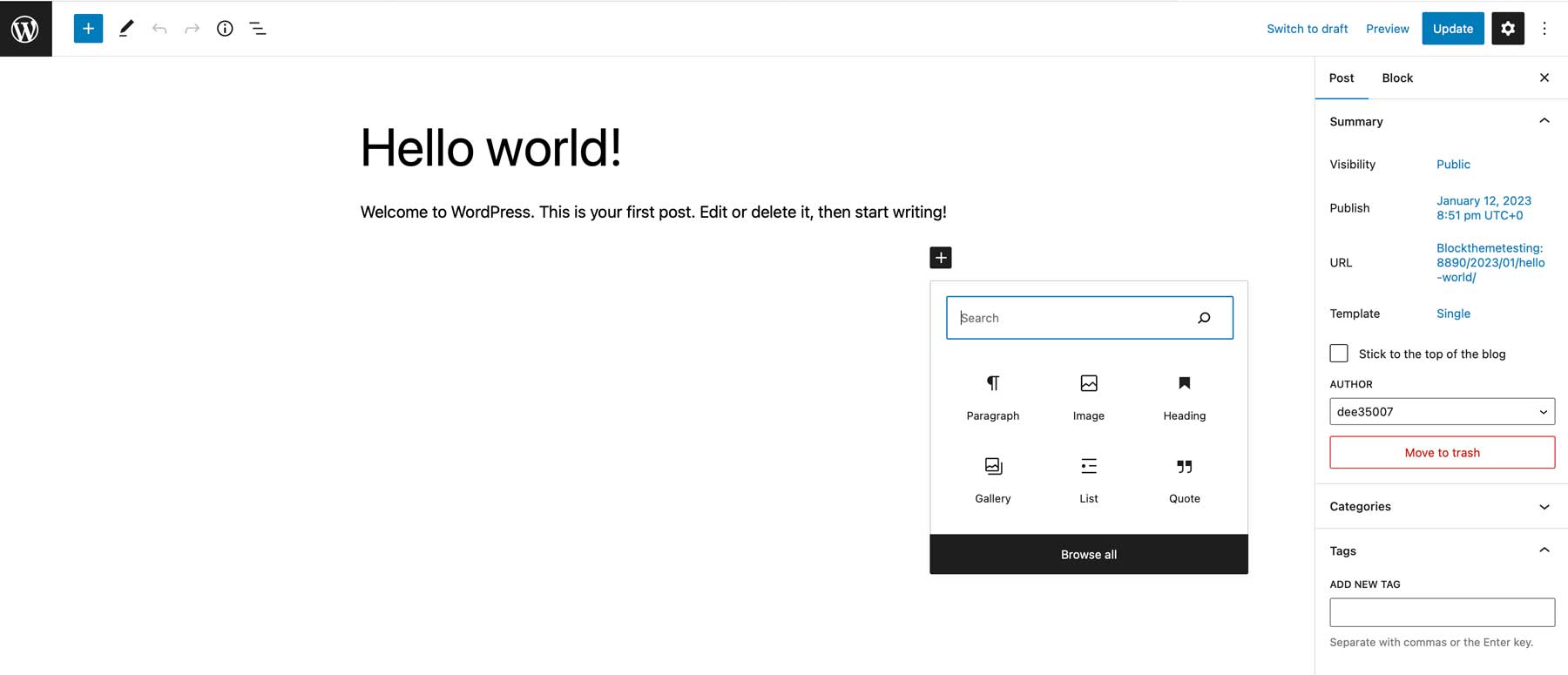
If you want a more powerful approach, most of the top free WordPress themes come with either a built-in page builder or integrated support for third-party builders like Divi. You get to pick and choose which builder works best for you and has exactly the experience you want.
However, the downside to this is that the only one built into WordPress itself is Gutenberg. And you have to research third-party developers to get more advanced ones.
Wix’s Builder
Wix’s customizable website’s core is user-friendly, unlike the dashboard. The design of the builders is aesthetically pleasing. Wix offers a step-by-step builder (Wix ADI) and a drag-and-drop builder. Dev mode (powered by Velo) allows you to add custom javascript for additional functionality, but you’ll need to upgrade your account to use it.
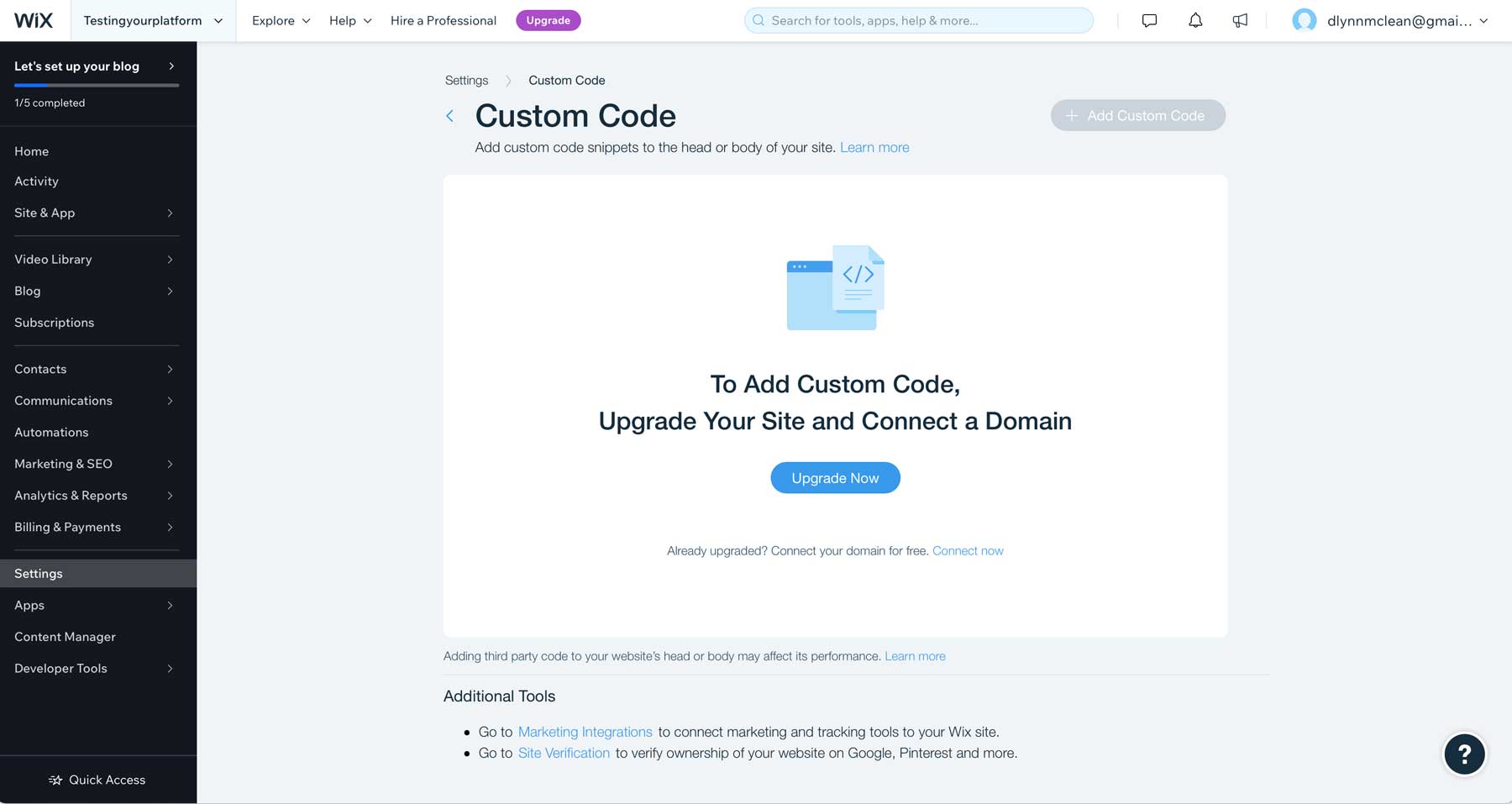
Neither builder is as effective as popular WordPress editors like Gutenberg. However, first-time users will receive a brief tutorial on adding elements, sections, and pages, and managing the business aspects.
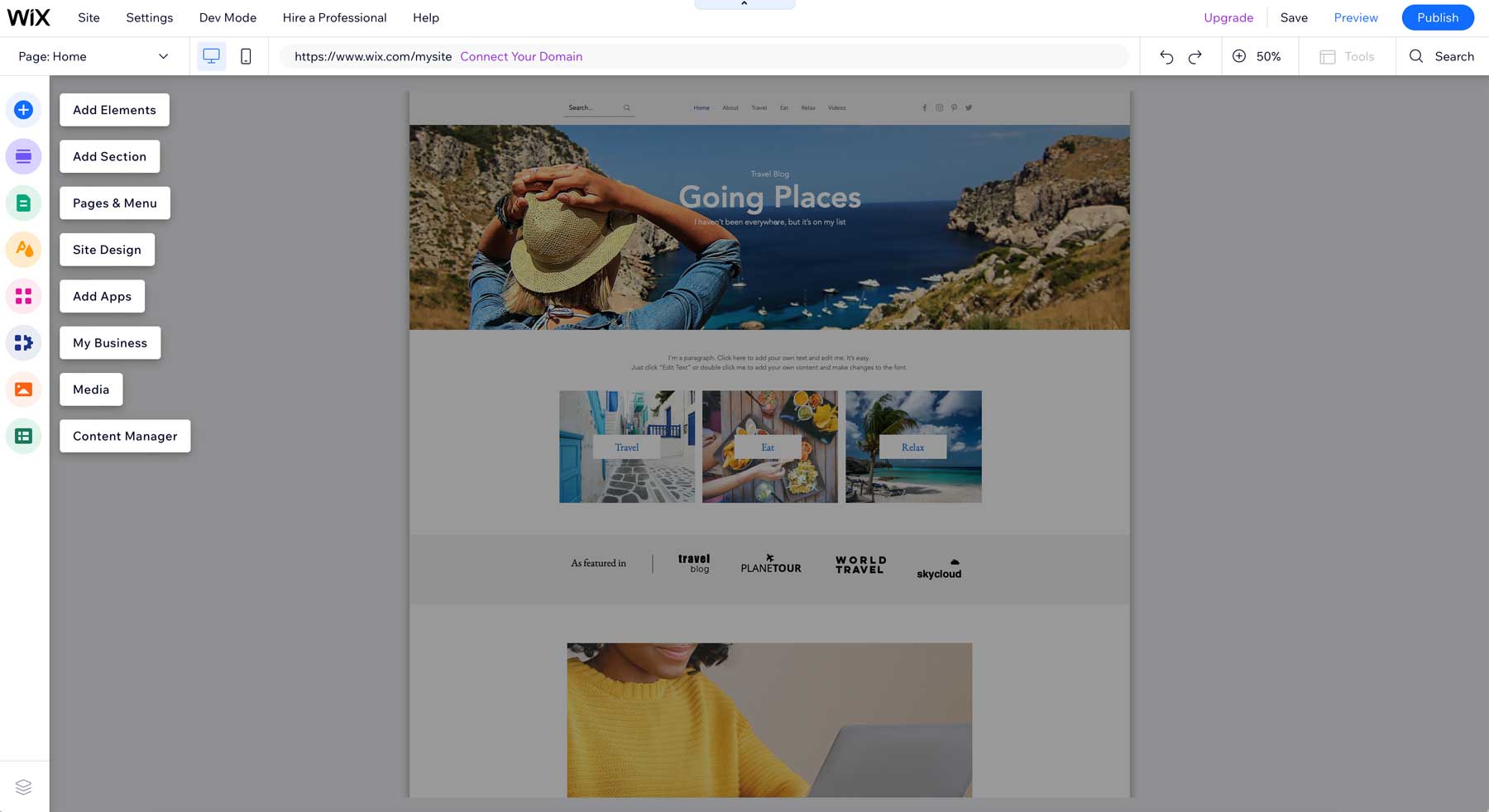
The drag-and-drop editor is a superior tool compared to the ADI builder, offering more control over individual elements. With drag-and-drop, you can move elements to any spot without CSS or other elements being affected.
You can swap between elements and pages, and those load a lot faster than the ADI editor. But it still lags in every browser we tried.
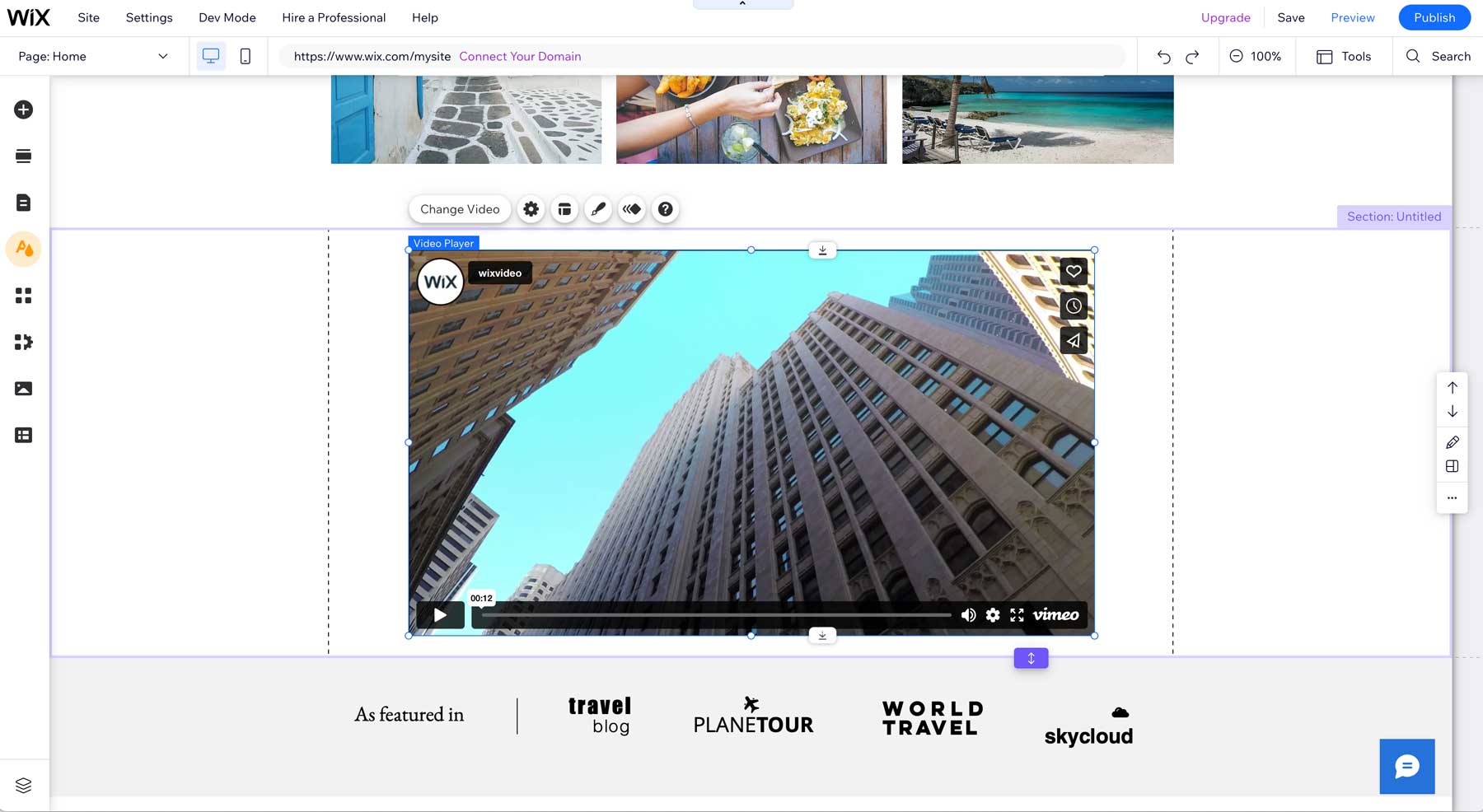
Overall, the Wix builder alone is enough to deter anyone who wants an easy, smooth experience. The app just has enough to be a contender for building a solid website that you can use for anything but a quick announcement or placeholder.
 |  |
|
|---|---|---|
| Page Builders | 🥇 Winner The Gutenberg Block editor is simple and intuitive. Plus, there are an abundance of third-party choices available. | While the aesthetics and overall design are nice, that's where the effectiveness of Wix ends. The builder is laggy, making swapping between elements painfully slow. |
| Choose WordPress | Choose Wix |
4. WordPress vs Wix: Customization
It’s easy to spend countless hours tweaking fonts, adjusting plugins, choosing colors, and editing templates. Making sure that your website is perfect for your users is a big part of what being a website owner is about. So we are going to take a look at what WordPress vs Wix offer you in terms of customization and being able to give your users the experience they deserve.
WordPress Customization
Other WordPress customization options outside of page builders and editors come built into the platform. You can add custom CSS to the site through the Theme Customizer, and even dig into the PHP files for your theme right through the back dashboard (though we don’t recommend doing that).
Part of what makes WordPress appealing is the ability to customize and tweak every aspect of your site. You can add plugins for new features, adjust themes, and dig into the code. That being said, with the introduction of full site editing themes, customizations span even further to custom templates, template parts, and block patterns, without having to edit a single line of code.
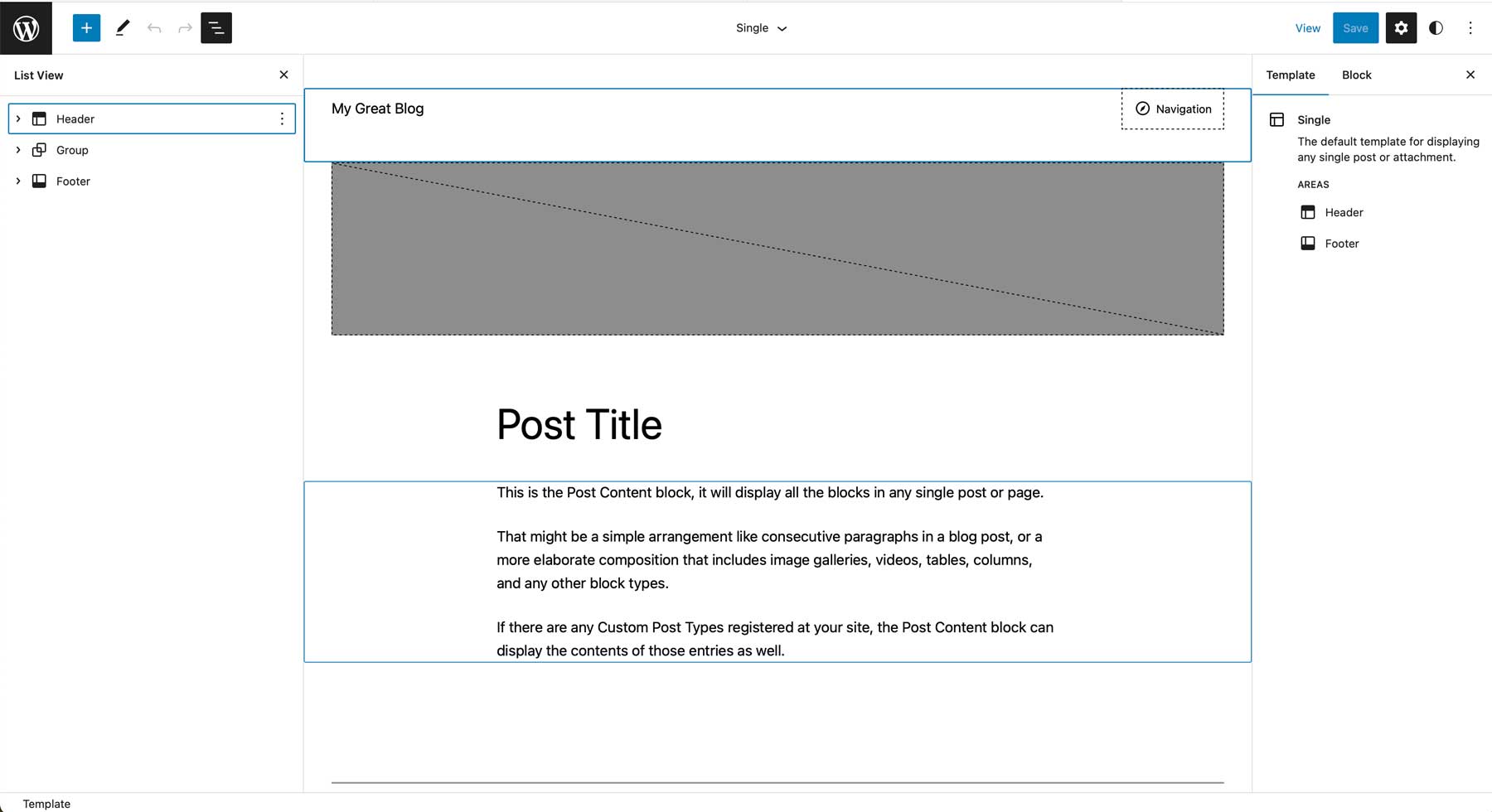
WordPress primarily relies on themes and plugins for customization, whereas Wix focuses on builder-based customization. WordPress.org offers a vast repository of themes and plugins to choose from for establishing a site’s foundation. Plus, there are countless third-party plugins to extend WordPress’s ability. For example, Divi users benefit from the Divi Marketplace, where they can boost Divi’s already stellar capabilities through plugins and extensions.
Theme developers usually include multiple customization options in their designs, enabling users to control the added elements. Users can extend site functionality by installing plugins, which add custom widgets, post types, scripts, and utilities.
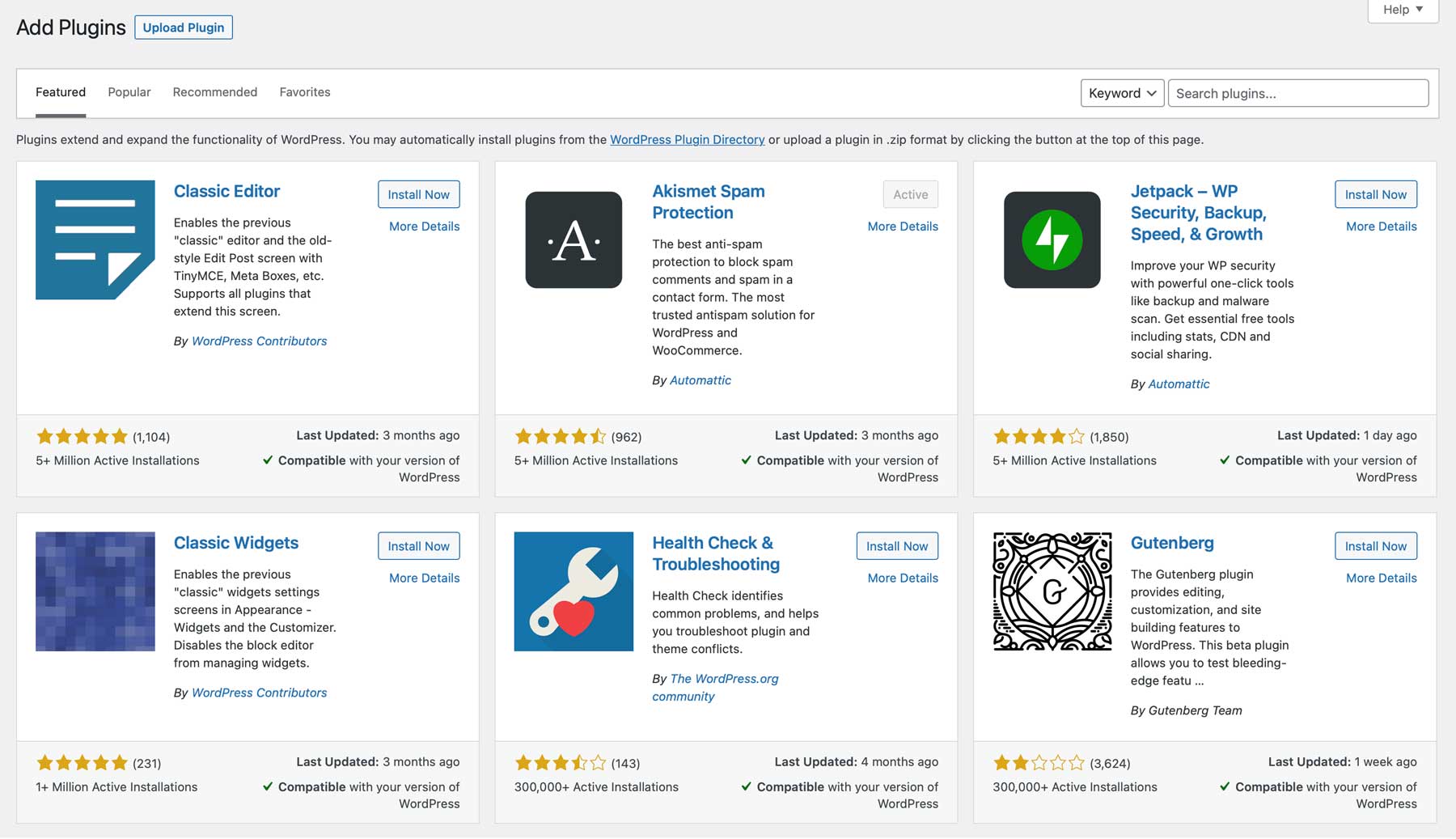
Wix Customization
In terms of customization, the options that you get in the builders are what you get with Wix. You can tweak elements and keep them all within the designs that will always make your website look put together and professionally designed. Regarding content, you can add whatever you want. Videos, photos, blogs, whatever.
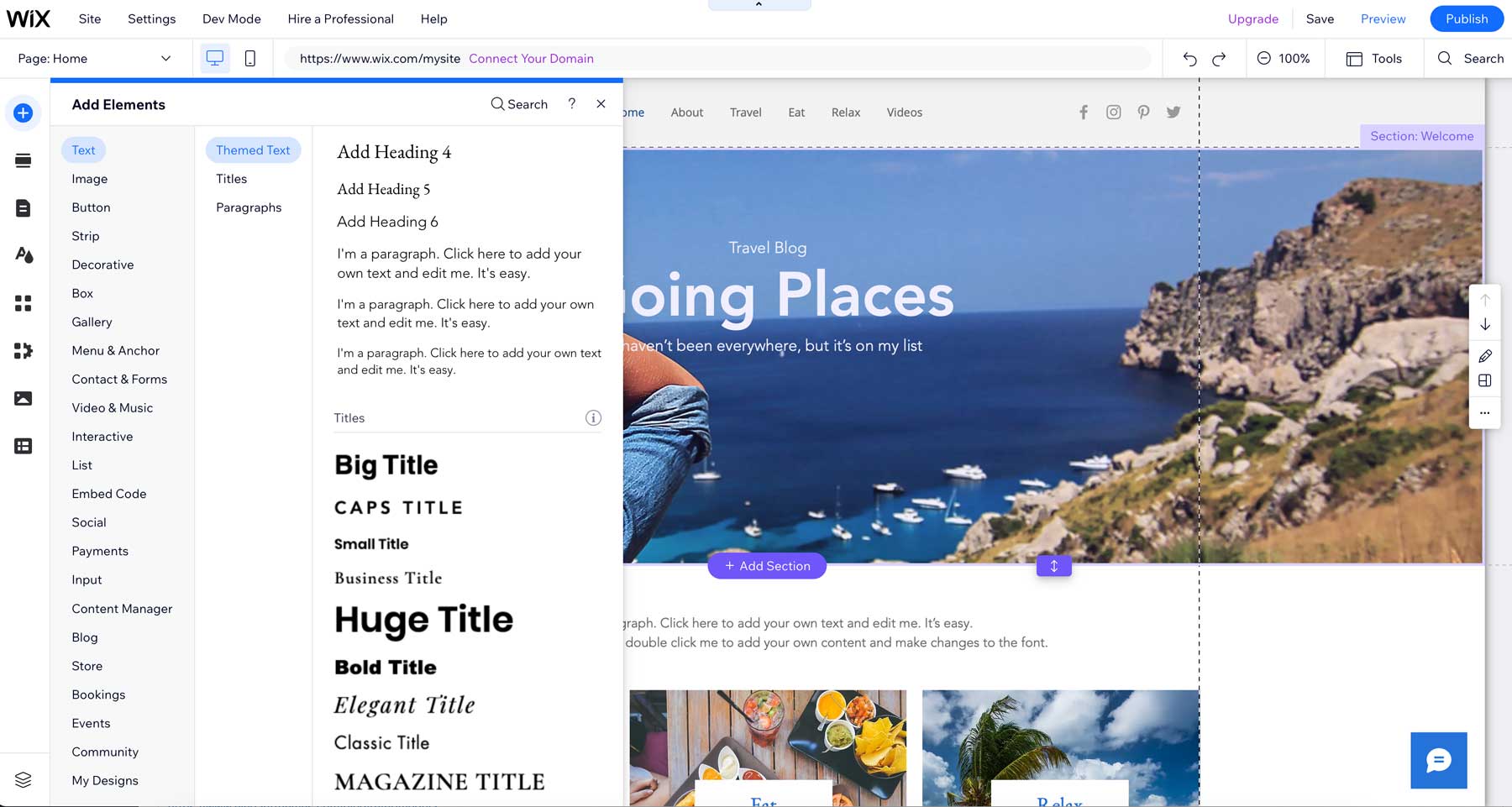
You can customize layouts and various elements for your eCommerce shops and blogs. In general, the customization options within Wix are comparable to other hosted builders like Squarespace or HubSpot. The intent isn’t to give you full rein, as in WordPress. It is to present you with a series of options that work well together and make an aesthetically pleasing final website.
This is good – because as we mentioned earlier – if you want to add anything else to the website via custom code (such as CSS), then you’re going to have to upgrade your membership.
Not even being able to customize CSS is a major lacking point for a website. This is only a limitation on free accounts, however, and a pretty standard one at that. Even free WordPress.com (which is also a free-to-premium platform like Wix) prevents free users from adjusting CSS for their themes.
 |  |
|
|---|---|---|
| Customization | 🥇 Winner WordPress shines in terms of customization based on the sheer amount of plugins and themes available, as well as the ability to add CSS for ultimate control. | What you see is basically what you get with Wix. While you can tweak the available elements, adding CSS will cost you additional fees. |
| Choose WordPress | Choose Wix |
5. WordPress vs Wix: Ecommerce
Making money by selling something on the internet is many people’s dream. You may want to sell courses or ebooks. Or you might want to have an online space for your in-person shop. Whatever your intent, both WordPress and Wix have quick-and-easy options for setting up shops.
WordPress Ecommerce
WordPress technically doesn’t have e-commerce built into it, but it has a robust selection of eCommerce plugins that you can add to your installation. With WordPress, you’re not restricted to just a traditional method of selling online. For example, you could use an auction plugin like Dokan Simple Auctions or YITH WooCommerce Auctions to build your very own bidding site. WordPress is powerful enough to set up your own eBay!
Out of all the available eCommerce plugins, however, the chief of them is the popular plugin WooCommerce. WooCommerce is a separate plugin that you will need to install, but it’s owned and developed by the same company as WordPress, so it might as well be a default e-commerce platform.
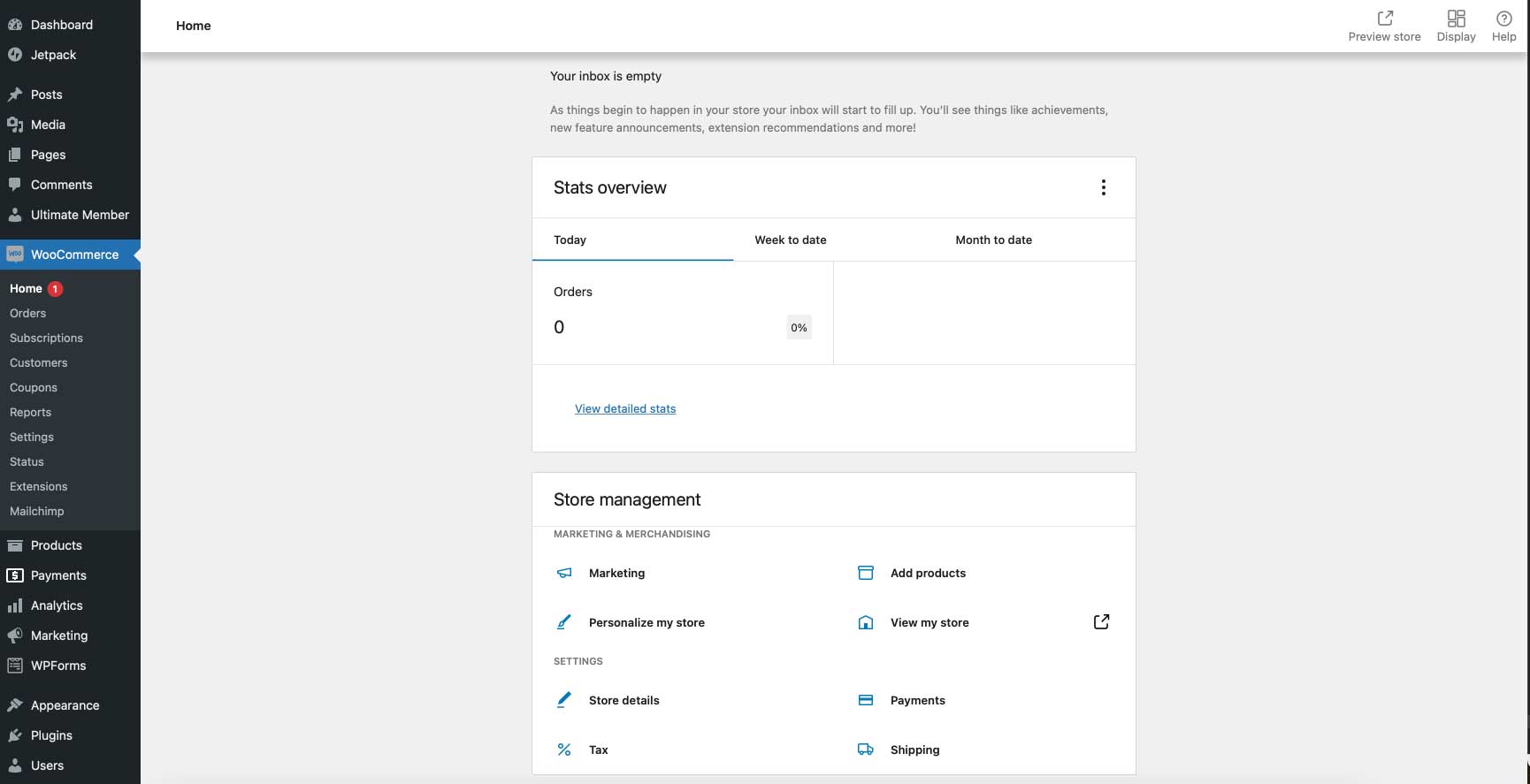
When you log into WooCommerce, you have a dashboard that includes full payment reporting, as well as a series of menus to the side with other default features. You get customer details, can create coupons, run reports, send emails to customers, check the status of orders, and so on.
By default, WooCommerce enables PayPal as a payment method. Because PayPal is one of the easiest payment processors available, there are a number of PayPal plugins available to integrate into WooCommerce. Even so, PayPal isn’t available in many countries, so you will want more than that. WooCommerce gives you the option for Stripe payments, too, as well as a feature called WooCommerce Payments that the company handles by itself. Plus, there is additional support for other payment processors, too.
WooCommerce Add-Ons
Furthermore, while WooCommerce offers an impressive selection of extensions to enhance its functionality, you may require additional plugins for specific features. These plugins are often available for purchase as premium or freemium options. Notably, Yith is a well-regarded company offering some of the best WooCommerce add-ons at both price points.
Fortunately, there are numerous options available for WooCommerce, such as SEO plugins, image gallery plugins and product image zoom plugins, which can greatly improve your online store. Additionally, for brick-and-mortar stores seeking to integrate their online and in-store inventory management, WooPos is an ideal solution to bridge the gap between the two systems.
Probably the biggest issue with WooCommerce is that the shop itself is not very customizable. You can adjust the layout some, but by and large, the majority of WooCommerce shops and products look eerily similar.
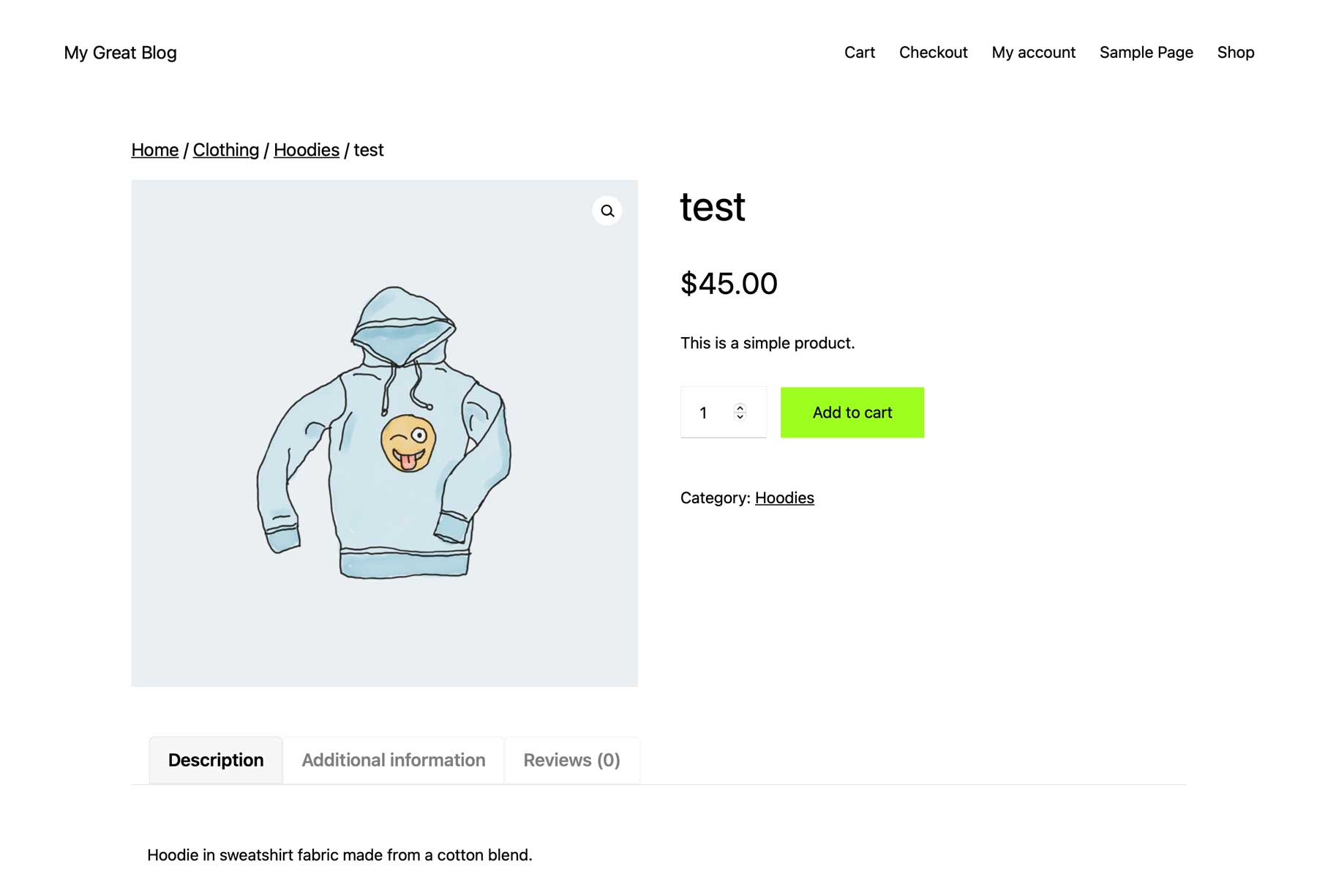
That being said, some premium themes and plugins can be used to create custom product pages. For example, Divi’s Theme Builder can create beautiful product page templates, as well as shop and category page templates with help from Divi’s built-in integration with WooCommerce.
We’ve went over WooCommerce in great detail here, but it is just one of several viable options. For simpler needs, many payment plugins will be more than enough.
Wix Ecommerce
First, we want to point out again that Wix is all about the upsells. The platform has an e-commerce shop built into the builder so you can go in and add products just like any other page. However, if you’re a free user (to whom Wix primarily advertises), you cannot accept online payments at all. So you’re forced to upgrade to a premium plan regardless.
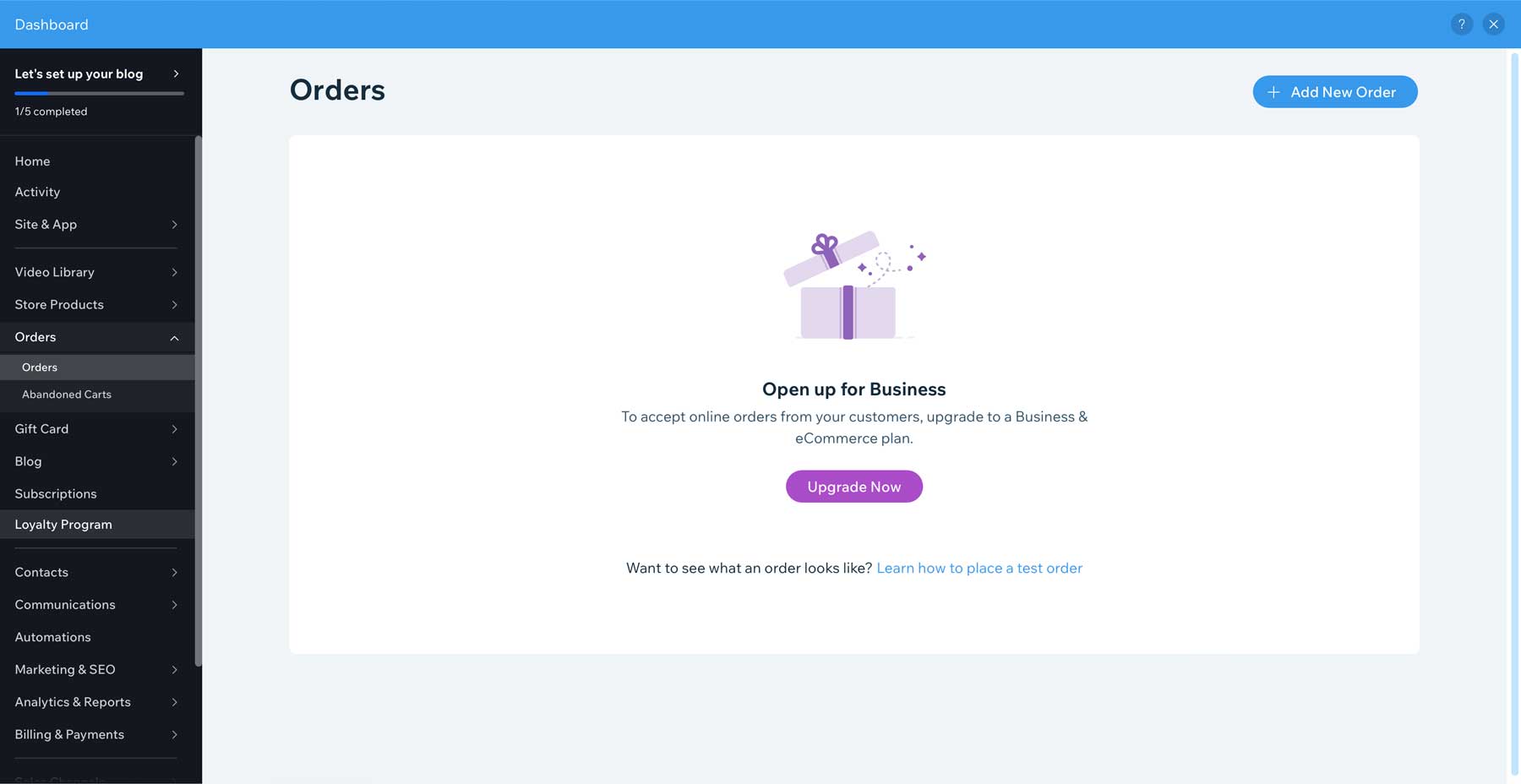
Adding products and using the actual builder is painless. It can be sluggish and slow to respond, but in comparison to WooCommerce, the UI is much easier to use. And nicer to look at.
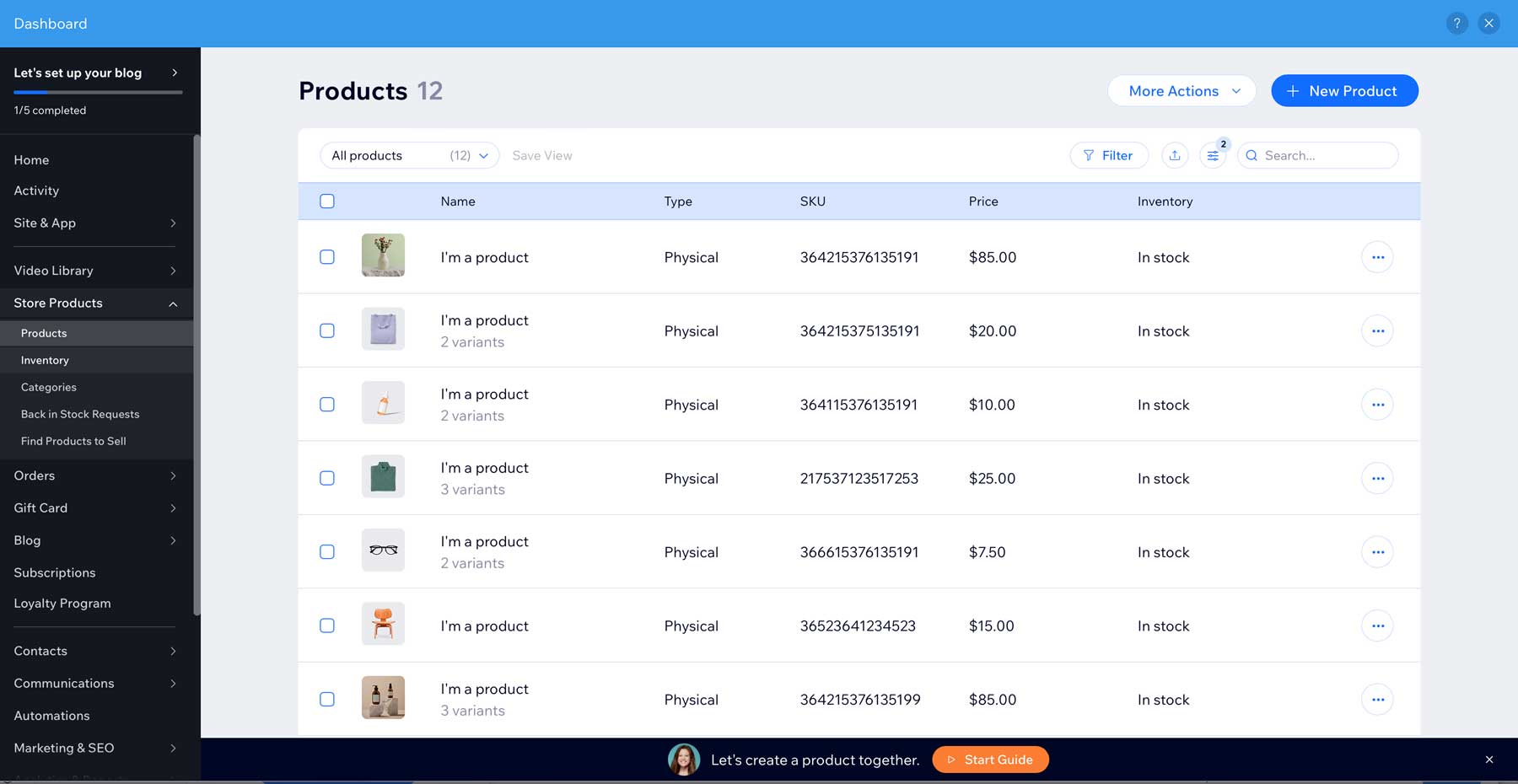
All of the options and information you need are in a single place, even creating coupon codes or sending emails to customers. This consolidation is a lot more useful than the WordPress way of spreading things out across multiple screens.
The shop is about on par with the WordPress one. You do get more customization options with Wix, but they’re pretty superficial. You can adjust margins and layout and how text appears and sorting, etc., but your store is probably going to be a pretty standard grid. That said, it probably will be with WordPress and WooCommerce too, unless you use a gallery plugin for displaying products.
 |  |
|
|---|---|---|
| Ecommerce | 🏳 Draw WordPress doesn't come natively with ecommerce functionality, but there are plugin options available. Woocommerce adds a shop to WordPress, but it's not the most straightforward to set up. | 🏳 Draw Wix offers the ability to add products in the free version of its software, but if you want to collect payments, you'll have to upgrade your account. That being said, adding products to the platform is quite simple. |
| Choose WordPress | Choose Wix |
WordPress and Wix Alternatives
One more thing. Before you make your final decision on your website platform…are you curious to see how WordPress stacks up against its other biggest competitors? We did the hard work and compared WordPress vs everything else so that you don’t have to! Most recently, we reviewed WordPress vs Squarespace, and I think you will be interested to see the results.
Should You Go with WordPress or Wix?
WordPress is a stronger platform than Wix in almost every way. While Wix has some nice features, such as a good UI and a cool drag-and-drop editor, we are not impressed with its platform. However, it is a decent service if you’re willing to upgrade your account a few levels.
Wix’s upselling suggests it targets those who want a free website, but its free option is not functional. Many reasons exist to avoid free websites. Wix markets itself as free, but to use the site you build, you must pay a considerable amount.
With WordPress, you do have to handle a lot more of the backend features. Like theme and plugin installation, maintenance, and hosting. But the power and lack of restriction the platform gives are more than worth learning how to do. Feature by feature, WordPress offers a smoother, more stable experience than the Wix platform.
That being said, WordPress has a slightly steeper learning curve to start, but if you intend to keep the website active for more than a month or two, we say go with WordPress over Wix because of its list of possible integrations, features, and customization options.
Final Comparison
Here’s a complete breakdown of all the features that both options offer. As you can see, WordPress wins by a wide margin. This is largely due to the fact that there are so many plugins and themes available. Plus, you have more options when it comes to hosting than you do with Wix. WordPress hosts are plentiful, but there are a few such as Cloudways and SiteGround that offer some stand-out features at a very reasonable price.
 |  |
|
|---|---|---|
| Ease of Use | 🏳 Draw Dashboard can be a bit difficult when a lot of plugins are installed, but the core elements are easy to understand. | 🏳 Draw Getting started is simple, with step-by-step instructions. That being said, the Wix dashboard is full of upsells and is very convoluted. |
| Page Builders | 🥇 Winner The Gutenberg Block editor is simple and intuitive. Plus, there are an abundance of third-party choices available. | While the aesthetics and overall design are nice, that's where the effectiveness of Wix ends. The builder is laggy, making swapping between elements painfully slow. |
| Customization | 🥇 Winner WordPress shines in terms of customization based on the sheer amount of plugins and themes available, as well as the ability to add CSS for ultimate control. | What you see is basically what you get with Wix. While you can tweak the available elements, adding CSS will cost you additional fees. |
| Ecommerce | 🏳 Draw WordPress doesn't come natively with ecommerce functionality, but there are plugin options available. Woocommerce adds a shop to WordPress, but it's not the most straightforward to set up. | 🏳 Draw Wix offers the ability to add products in the free version of its software, but if you want to collect payments, you'll have to upgrade your account. That being said, adding products to the platform is quite simple. |
| Choose WordPress | Choose Wix |
Frequently Asked Questions (FAQs)
Before we wrap up, let’s answer some of your most common questions regarding WordPress and Wix. Did we miss one? Leave a question below, and we will respond!
Which is best, WordPress or Wix?
Is Wix more difficult to use than WordPress?
What are the key differences between WordPress and Wix?
Which is more SEO-friendly, Wix or WordPress?
Can you switch from Wix to WordPress?
Which platform provides quicker loading times, Wix or WordPress?
Which is more customizable, WordPress or Wix?
Is WordPress more suitable for eCommerce compared to Wix?
Which is more economical, Wix or WordPress?
How do Wix and WordPress compare for beginners?
We hope you’ve enjoyed this WordPress vs Wix comparison. Which are you leaning toward now? WordPress or Wix?

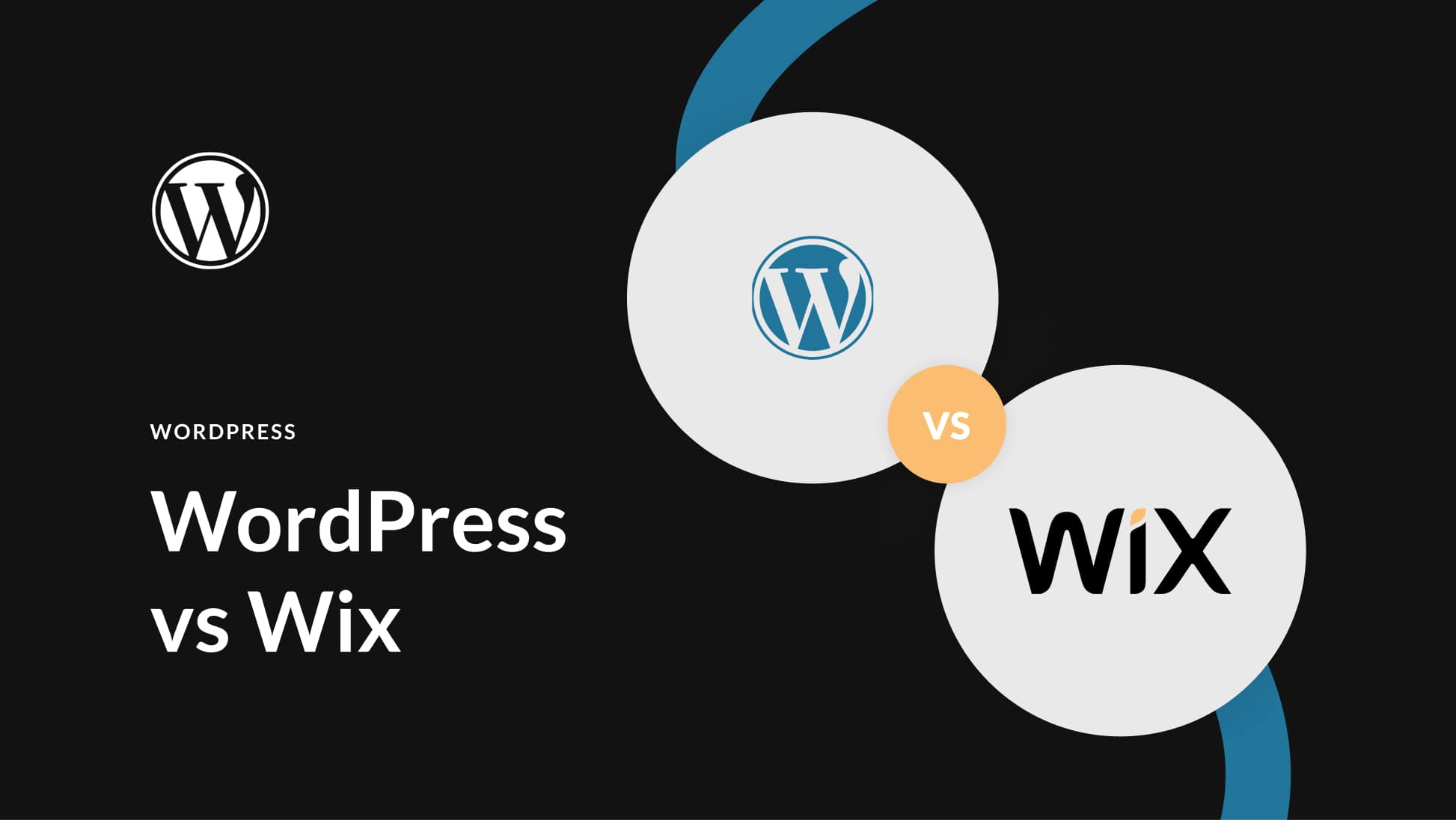




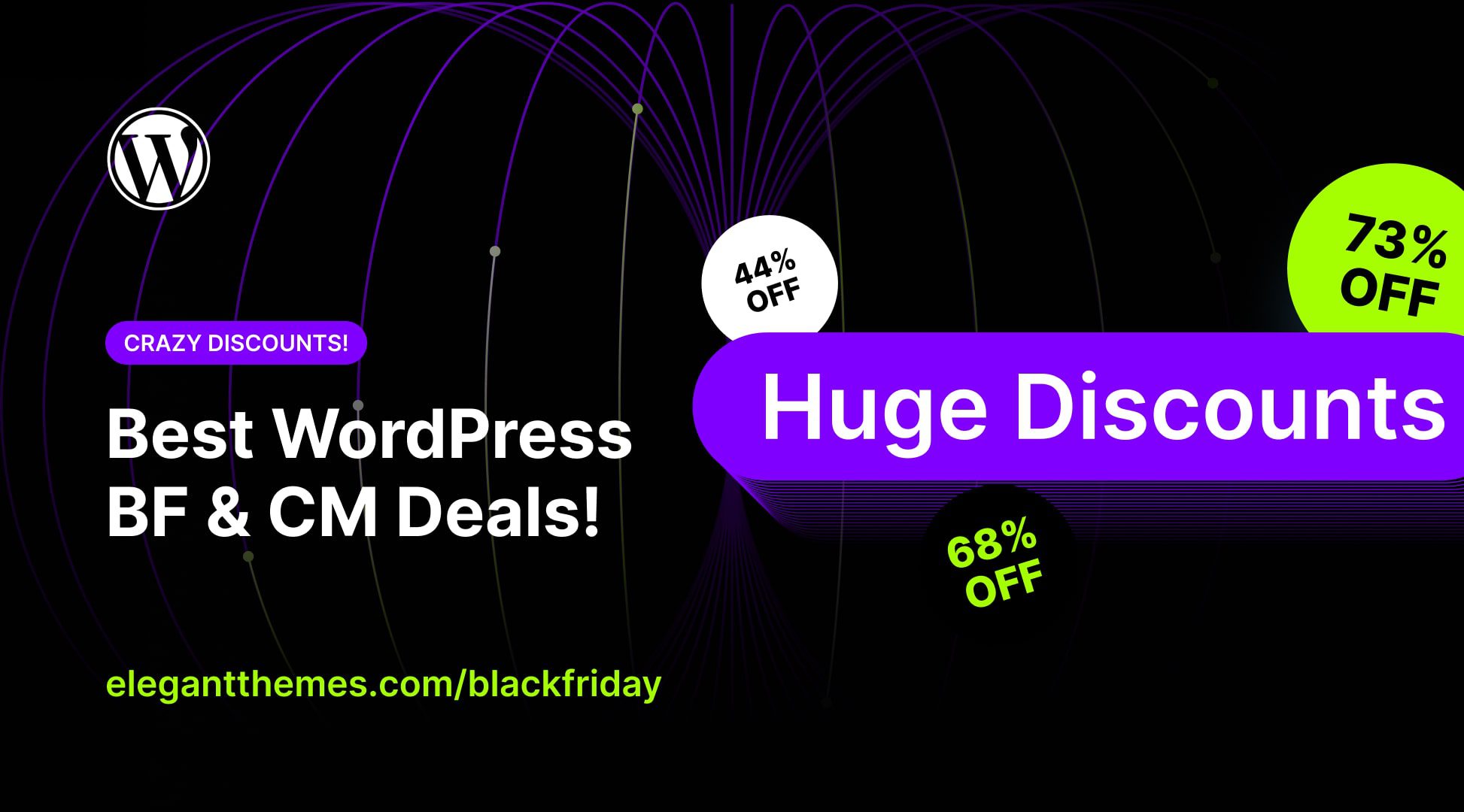

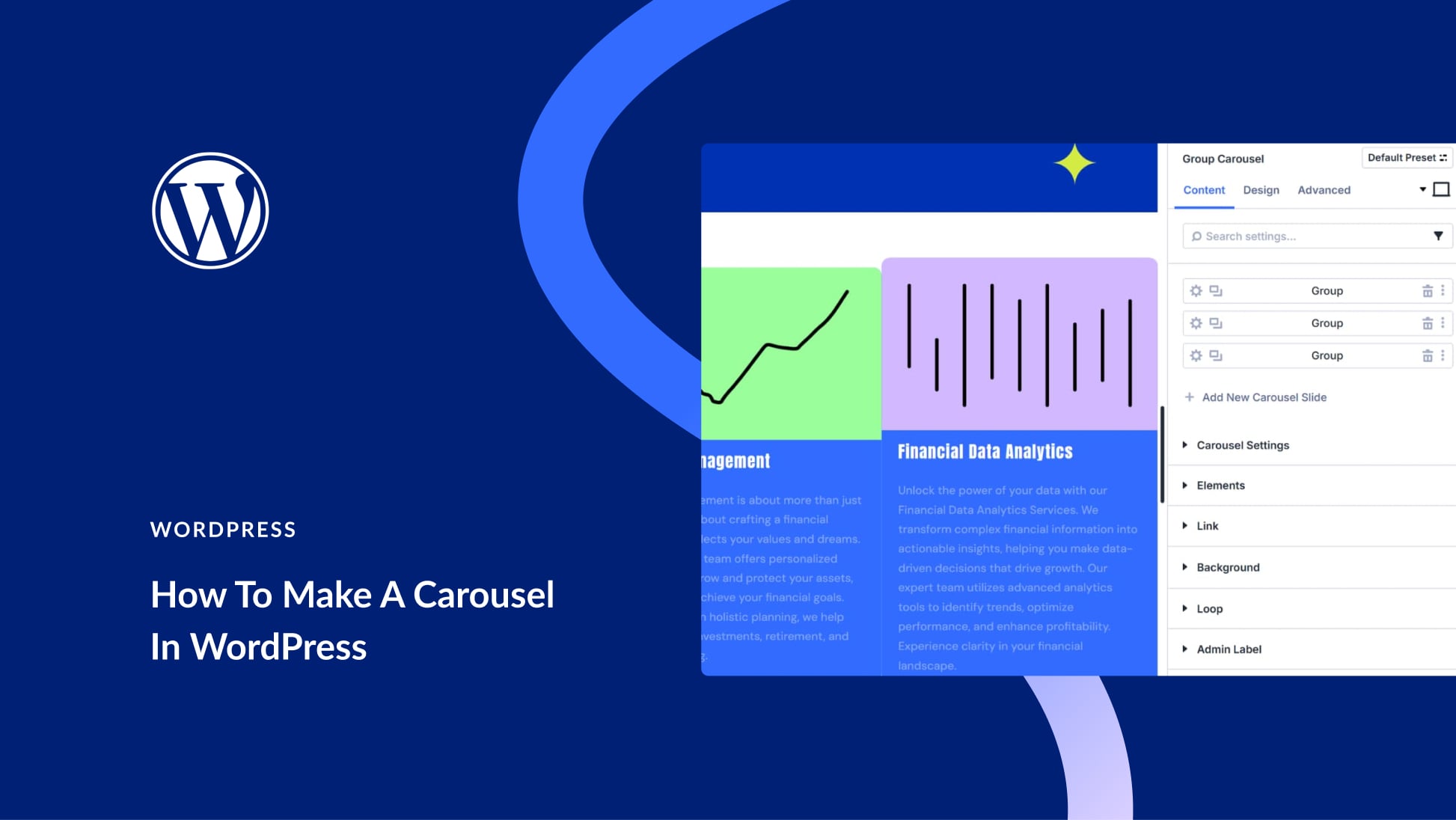
i am from rwanda! i loved how word press is more sustainable than wix.
i used wix but it is really not better than wordpress. thank you for this post
i would always think wp is better, i think 43% of blogs are on wp, but i have never used wix, i like the builder on wp and it seems really easy to use for me.
Both WordPress and Wix have strengths and weaknesses.
WordPress has a larger market share, but it can be difficult for new users to navigate. Wix is more simple to use, but it can be cluttered and difficult to navigate.
I’ve used both. I prefer WordPress.
I really appreciate this comparison, as I’ve often wondered if Wix would be a better choice for a “simple” site.
I prefer WordPress. It is easy to use it. you can edit any part of the website in a few clicks. No skills that are required to start using. WordPress got plugins that makes almost everything automatic.
I love to use Divi Builder. I am using this for my client i can design whatever i want with divi….
We love wordpress and for SEO is the best option. As an outstanding Divi builder makes design work easier
Over the years, I have been using WordPress but there has been a lot of changes made to Wix lately. Thank you Keeton for sharing this.
Like Rodrigo I use WordPress and Divi exclusively and like Bill I am a sole-proprietor who makes a living designing websites for clients. One big factor that keeps me going as I am, is the fantastic support given by Divi. There have been hitches in the past but my recent experience, when I’ve had an issue, is that the Divi team have responded within an hour or so. I have no experience of Wix support but doubt they will match that. Thanks ET – you’re great!
Agreed — Divi support is fantastic.
I am not a fan of Wix for the reason of paying for the add ons and the limited SEO. I am a WordPress user all the way!
Hey,
If I may, from our experience and the experience of our customers, Wix is rather an easy quick to configure solution with a great marketing. Next to that, you reach quite quickly the limits of the tool. For instance, in e-commerce, as we are European, we face in-country and in the UE market several VAT rates. This is simply not possible to manage in Wix. So this ends quickly the game as your e-commerce wramps up.
cheers
Christian
Ive used both wordpress and wix and ill have to admit that wix is perfect for the complete beginner. The webpage builder is easy to use and you can really design stunning websites. But I ultimately made the move to wordpress because I found wix very limiting. As you mention, its a steeper learning curve, but worth it for business growth and success!
I’m neither a developer or a website guru yet I am a marketing maven with education on how to set up websites backed with statistical information on the pros and cons. Several times I’ve heard from Wix users that they have lost published site info and not been able to retrieve it back. One client lost her site so while that was a few years ago and they may have evolved, the feedback I’ve had (often enough to speak out about it) is to stay clear of Wix.
You should to try EditorX then You will got much better experiences
I wouldn’t say, as Bill does, “Wix is awful “ but. I had the opportunity to return to Wix very recently and was surprised at how much it had improved since the last time I use it 5 years ago. In responsive settings it’s very limited, though.
I use WordPress and Divi exclusively, but would not hesitate to working with Wix if the opportunity arose. “Different strokes for different folks”.
Admittedly, it is a great deal better than it was 5 years ago. I will totally agree with that. But even still, I feel like it’s a lackluster experience and there are better options out there, even excluding WordPress.
This may be self-serving, but as a sole-proprietor who makes a living designing websites for clients, I think the biggest problem I have with Wix is that it gives the non-technical business owner a false sense of “I’ll save some money and do it myself.” They pay a monthly fee to develop what, on the surface, is a fairly attractive site. However, it has limited capabilities (unless you upgrade — and even then it still has limitations). They are setting themselves up for disappointment and they are also limiting their site’s functionality — often without realizing it.
There is a reason I take my car to a mechanic. I own a socket wrench so I can pull the tire off my car. The question is, am I really qualified to replace the brake pads?
Fifteen years in this business (with six of them using WordPress almost exclusively) has given me a lot of trial and error benefits that the Wix user will never have. It isn’t much different than Ian Malcolm’s rant at the Jurassic Park dinner table: “It didn’t require any discipline to attain it … you didn’t earn the knowledge for yourself. You stood on the shoulders of geniuses to accomplish something as fast as you could. Your scientists were so preoccupied with whether or not they could, they didn’t stop to think if they should.”
I may not be a genius, but I’m smart enough to know you get what you pay for when you hire someone who makes a living from providing the service that you need.
In a nutshell, Wix is awful.
I think that’s the crux of it right there: “They are setting themselves up for disappointment and they are also limiting their site’s functionality — often without realizing it.” That pretty much succinctly puts my whole article into a TL;DR. So thanks! 😉
Great overview. One correction: The following sentence is not a complete sentence:
“Because PayPal is one of the easiest payment processors available.”
There is an “X” in the name for a reason…avoid WIX as a design tool.
Tool many small businesses have used WIX since they thought it was easy. “Oh How nice our website looks,” but they rarely fully optimize any of the content in a WIX site, building it for the human and not for both the human and the search engine. More images than text.
Also a study I saw over a year ago showed that the Google did not highly rank WIX based sites.
The other problem I see is when a business tries to move the site, as some of my new clients have asked, it does a mean a rebuild of the site. The design tool is proprietary. WordPress on the other hand it is easy to move the site to a new host (as a general rule).
I dont get it. Why all these wordpress vs xxx. You should just make Divi faster and the one choice to make.